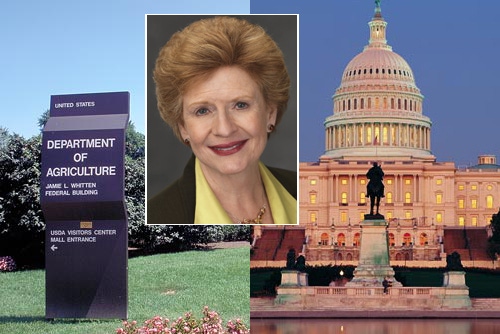September 30, 2019

As the Trump administration continues to advance its controversial move of the USDA Economic Research Service and National Institute of Food and Agriculture from Washington, D.C., to Kansas City, the ranking member of the U.S. Senate Committee on Agriculture, Nutrition and Forestry sounded an alarm.
“I am deeply concerned about the lack of capacity at NIFA and ERS due to the Trump administration’s decision to relocate these agencies,” wrote Sen. Debbie Stabenow, D-Michigan, in a letter to Agriculture Secretary Sonny Perdue. “Over the past year, the administration has repeatedly told Congress that the relocation would not affect capacity to administer research grants, conduct economic research, and carry out the critical missions of these two agencies.”
As of the end of September, three-quarters of the staff at the Economic Research Service have retired, quit, were terminated or plan to leave by year-end, according to Bloomberg News. USDA has hired nine new employees in Kansas City to fill the vacant positions in both the ERS and NIFA.
The lack of capacity due to the relocation is affecting Farm Bill implementation, Stabenow said. Just days before the end of the fiscal year, funding made available through NIFA has not been awarded for several grant programs, including those that help fruit and vegetable growers, organic producers, and beginning and socially disadvantaged farmers. Many of these grantees already received notice of an award with a Sept. 1 start date, but funding could be delayed for months, preventing grant recipients from starting their important projects. Stabenow wrote that 9% of current NIFA employees in the Office of Grants Management agreed to relocate.
Stabenow raised several questions about the impact of staffing shortages and requested a thorough explanation of how USDA plans to fill its capacity for both NIFA and ERS.
The ERS and NIFA are considered the best in the world at what they do, but they have endured some rough treatment from the Trump administration, GPB Radio News reports.
News articles have revealed that dozens of ERS reports will be delayed due to staffing shortages, including monthly commodity price forecasts that are used by farmers to help manage their businesses.
Politico reported on Sept. 24 that mass attrition at the Economic Research Service will result in “significant delays” in research reports. The agency identified 38 specific reports that will be delayed, with topics including dairy industry consolidation and food security among veterans. Some reports may be discontinued.
The ERS is struggling to maintain basic functions with a gutted workforce, The Hill reports.
Some say the relocation is being done to stifle employees whose research conflicts with what the administration is saying.
"This is one of the great tragedies of the Trump administration," Food writer Corby Kummer told Boston Public Radio. "These researchers have been compiling the statistics of crop yield, weather patterns, and productivity for animals, but they're 'too science-y.' They have bad news about climate, and the Trump administration has waged a war on science."
The Trump administration is restricting USDA scientists from speaking about climate change and blocked testimony to Congress, Senate Democrats say. The studies aren’t getting to farmers who rely on what the reports say. MinnPost reports only 7% of the original 280 climate scientists in the ERS and NIFA are moving to Kansas City.
About the Author(s)
You May Also Like




